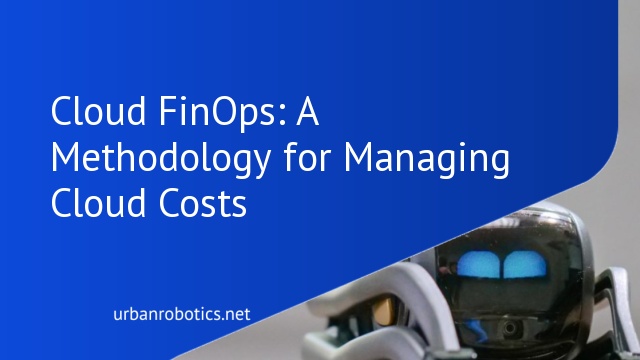Are you interested in optimizing cloud costs while increasing department efficiency? If so, you might want to consider Cloud FinOps. This methodology aims to improve collaboration between finance, operations, and development teams to manage cloud costs more effectively. It focuses on cost optimization, forecasting, and accounting. In this article, we will explore what Cloud FinOps is, its benefits, principles, and how to implement it in your organization.
What is Cloud FinOps?
To understand Cloud FinOps, we need to look at its philosophy, methodology, and practice. Cloud FinOps is a management practice that focuses on optimizing cloud computing infrastructure’s financial performance. It involves cross-functional teams working together to manage cloud costs through cost optimization, forecasting, and accounting using automation and cloud cost management solutions to improve efficiency and control costs.
- Cloud FinOps is a framework designed to manage the variable spend model of the public cloud.
- It is a methodology that enables engineering teams to deliver better features by empowering them to make informed cloud decisions.
- It is about making money by enabling cross-functional conversations about where to invest technology resources and architecting cloud deployments.
- Cloud FinOps deals with understanding and controlling cloud costs and value by balancing speed, quality, and cost efficiency.
- It is a cultural practice that aligns business goals with cloud spending. It is a framework where all teams within an organization can work together to make the best cloud investment decisions.
Cloud FinOps is not just a framework; it is a distributed methodology that involves a central team and cross-functional stakeholders. By leveraging real-time data, Cloud FinOps helps individuals make better cloud decisions. It eliminates the trade-offs between cost optimization and innovation by providing a practical approach that balances economic benefits and cloud architecture. Through iterative resource planning, forecasting, and optimization, Cloud FinOps facilitates continuous improvement and accountability.
Cloud FinOps concepts include:
- Shared responsibility: All departments control costs.
- Cloud cost centers of excellence (CCoE): Cross-functional teams work together to manage cloud strategy and governance.
- Variable spend model: cloud costs vary depending on usage, and it’s a pay-as-you-go model.
- Best decisions: Use real-time data to make informed cloud decisions.
- Ownership: Individuals own and control their cloud deployments.
In the next section, we will discuss Cloud FinOps principles.
The Principles of Cloud FinOps
The Cloud FinOps methodology guides teams’ activities is based on six principles:
- Team collaboration: Teams work together to manage costs and improve efficiency.
- Ownership: Individuals own their cloud deployments, controlling costs.
- Central control: Governance policies are established by a multidisciplinary central team.
- Accessible reports: Real-time data is available for analyzing and controlling costs.
- Business-driven decisions: Decisions align with business goals.
- Leveraging the public cloud variable cost model: Plan for flexible costs that depend on usage and demand.
Cloud Cost Centers of Excellence (CCoE) are cross-functional teams responsible for managing cloud strategy, governance, and best practices in an organization. CCoEs provide guidelines and policies to balance cloud computing benefits while controlling overall costs. They represent all aspects of cloud operations, from finance executives to developers and operations teams.
Cloud FinOps ensures that all departments within the organization collaborate and work towards the same cloud cost control goals, aligned with business goals. These principles are essential to ensure methodology effectiveness and provide a solid foundation for a Cloud FinOps team.
Benefits of Cloud FinOps
By implementing Cloud FinOps, organizations can reap a multitude of benefits, such as improving financial performance and reducing cloud computing costs. Some of the benefits of Cloud FinOps methodology are:
- Reduced cloud computing costs: Cloud FinOps helps you control expenses by optimizing and forecasting costs, and budgeting.
- Improved financial performance: Cloud FinOps helps you save money on cloud deployments while still delivering value.
- Better decision-making: By leveraging real-time data, you can make informed cloud decisions.
- Increased transparency: With easily accessible reports, everyone can see and control costs in real-time.
- Increased cloud efficiency: Collaboration between teams within the organization can lead to better cloud cost management and increased cloud efficiency, reducing the time and effort required to manage the cloud.
- Informed decision-making that aligns business goals with cloud spending: A solid foundation of governance policies and guidelines ensures that decisions align with business goals, providing a clear vision of your cloud expenditures.
Ultimately, Cloud FinOps is that it helps organizations understand what they’re spending on cloud services in an informed way. This empowers them to make better decisions that align with their business goals.
Implementing Cloud FinOps
When implementing Cloud FinOps, collaboration between finance, IT, and DevOps teams is essential. A four-step approach can be used, including analysis, benchmarking, optimization, and negotiation.
- Analysis: Understand current consumption and costs.
- Benchmarking: Compare costs with similar organizations.
- Optimization: Make changes that control costs.
- Negotiation: Work with CSPs to find the best deals.
Governance policies overseen by a multidisciplinary team, are used to establish a suitable balance between performance and cost across cloud engagements. These policies also facilitate better vendor management and cloud cost management.
Cloud FinOps design principles include collaboration, accountability, and business value-driven decisions. These principles ensure everyone is on the same page, leading to successful implementation.
Training and cultural practices are also essential when implementing Cloud FinOps. It would be best to create a team responsible for implementing Cloud FinOps and build a centralized team to manage and oversee governance policies and best practices. This would get everyone on board.
Cloud FinOps is a methodology that enables organizations to manage cloud costs through shared ownership and collaboration between finance, operations, and development teams. By implementing Cloud FinOps, organizations can optimize their cloud cost structure and achieve financial accountability for cloud services.
Cloud FinOps provides a framework for your team to make more informed cloud decisions that align with business goals. It also improves collaboration between teams, leading to a more efficient and cost-effective cloud environment. By balancing economic benefits, innovation, and cost efficiency, Cloud FinOps helps organizations achieve cloud deployment goals.
As a nonprofit trade association, the FinOps Foundation provides extensive resources and best practices for Cloud FinOps. Consider partnering with us to learn more about making the most of your technology investment.





